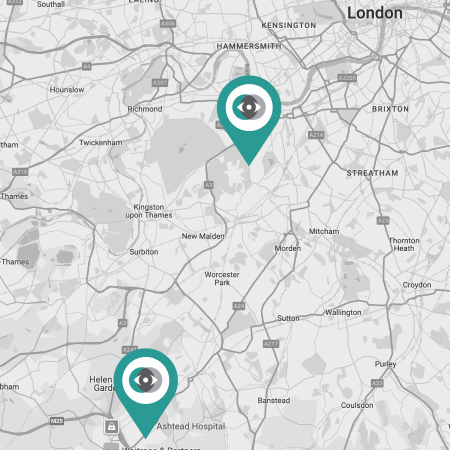
What happens if cataracts are left untreated?
Cataracts develop slowly, so it’s easy to delay doing anything about them. Many people put off surgery because they feel they’re managing well enough or they’re anxious about the procedure itself.
But cataracts don’t go away on their own. Left untreated, they continue to progress. Over time, they can seriously affect your safety, independence, and quality of life.
In this blog, we’ll explain exactly what happens when cataracts are left untreated and why early intervention, especially with private cataract surgery from Professor Paul Ursell, can make such a difference.
What are cataracts, exactly?
Cataracts are caused by the clouding of the natural lens inside your eye. This lens normally focuses light onto the retina, helping you see clearly. As the lens becomes cloudy with age, light is scattered or blocked, leading to blurry or distorted vision.
Cataracts are progressive, which means they gradually get worse over time.
Early signs of cataracts
In the early stages, cataracts may not interfere much with daily life. You might notice:
- Blurred or hazy vision
- Colours looking duller
- Increased glare from lights
- Difficulty seeing at night
- Frequent changes in glasses prescription.
Many people adapt to these changes without realising how much their vision has declined.
What happens as cataracts worsen?
If left untreated, cataracts eventually cause significant vision loss. This affects:
- Reading: even with strong glasses
- Driving: especially at night
- Watching television or using devices
- Recognising faces
- Moving safely around your home or outside.
Tasks that were once easy become difficult or impossible.
Increased risk of falls and injury
Poor vision is a major risk factor for falls, especially in older adults. If you can’t see steps, curbs, or changes in floor level, it’s easier to trip.
Falls are one of the leading causes of injury and hospitalisation in people over 65. Untreated cataracts increase this risk significantly.
Reduced independence
When your vision declines, everyday activities like shopping, cooking, or reading medication labels become more difficult.
You may start relying on family, neighbours, or carers more than you’d like. For many people, this leads to feelings of frustration or loss of confidence.
Emotional and mental health impacts
Vision loss can affect more than your physical abilities. It’s common to feel:
- Isolated or withdrawn from social activities
- Less confident in public
- Anxious about going out
- Frustrated by the inability to do things you used to enjoy.
These changes can have a knock-on effect on your mental wellbeing.
Vision Loss is a contributor to Dementia
Prof Ursell is one of the few Ophthalmologists who specialises in Dementia as well as cataracts. Vision loss as well as hearing loss are associated with Dementia so it's now advisable to have early surgery to protect yourself from Dementia.
Can cataracts cause blindness?
Yes—if left untreated, cataracts can eventually cause legal or complete blindness. The World Health Organization lists cataracts as one of the leading causes of blindness worldwide.
While this is more common in countries without access to surgery, it’s a serious possibility if cataracts are allowed to progress too far.
Why people delay treatment
Some people delay surgery because:
- They think their vision is “not bad enough yet”
- They’re afraid of surgery
- They assume they need to wait for NHS availability
- They don’t realise how much better their vision could be.
But there’s no benefit to waiting until vision gets worse. In fact, the earlier cataracts are treated, the easier and safer the procedure tends to be.
How private cataract surgery can help
Choosing private cataract surgery with Professor Paul Ursell means:
- No long wait times
- Thorough consultation and diagnostic scans
- Access to premium lens implants
- Faster return to clear vision
- Personalised individual care from Prof Ursell every step of the way.
Restore your independence and quality of life
With cataract surgery, many patients say they feel like they’ve got their life back:
- Reading is easier
- Driving feels safer
- Colours look brighter
- Day-to-day activities feel effortless again.
And with the right lens, you may be able to reduce or even eliminate your need for glasses.
Final thoughts
Cataracts are common but they shouldn’t be ignored. Left untreated, they will continue to impact your life. Fortunately, with modern cataract surgery, you don’t have to live with poor vision.
If you're unsure whether you're ready for surgery, start with a quick self-test.
Are you suitable for vision correction surgery?
It isn’t suitable for everyone.
The first step is to book an assessment so you can find out whether you can benefit.
Our most popular procedures
What our patients say…
★ ★ ★ ★ ★“Excellent result. Complete confidence in Paul Ursell. Quiet, quick, and efficient. Peaceful and comfortable hospital.”
★ ★ ★ ★ ★
“The cataract surgery on both of my eyes went very smoothly without any problems. There was no pain afterwards and I didn’t have to wear any eyepatch. I would highly recommend Professor Ursell for cataract surgery.”
★ ★ ★ ★ ★“Highly professional, extremely efficient, and an excellent communicator, Paul exudes experience, knowledge, and ability. The whole process — initial consultation, operation, and post-op check-up — was wonderfully stress-free. I now have 20/20 vision, am glasses-free, and I am delighted by the results.”
★ ★ ★ ★ ★
“The cataract surgery has completely changed my life. Mr. Ursell put me at ease and explained all options. The procedure was quick and painless and completely successful, and I now have 20/20 vision in my good eye. One of the reasons I had the surgery was because of Mr. Ursell’s standing and experience. Cannot praise highly enough.”
★ ★ ★ ★ ★
“I was very short-sighted and my cataracts badly affected both reading and distance acuity. After the operation I now have very good distance vision (glasses-free) but still need glasses for reading. (This was the expected outcome as I did not want multi-focus implants). The operation was quick and painless, and I had no post-operative discomfort at all (which surprised me). The results are remarkable.
I can certainly recommend Professor Ursell. He is a personable consultant and a skilled surgeon.”
★ ★ ★ ★ ★
“Dr. Paul Ursell squashed many of my concerns for not having cataract surgery. He offered comfort with examples of his long/distinguished career and new technology that he applies to the surgery.
Both before and after the surgery, Dr. Ursell and staff gave me the information and attention I needed. It was a great success, and I highly recommend Dr. Ursell.”
We have replaced the images of real patients who provided these testimonials to protect their privacy.








